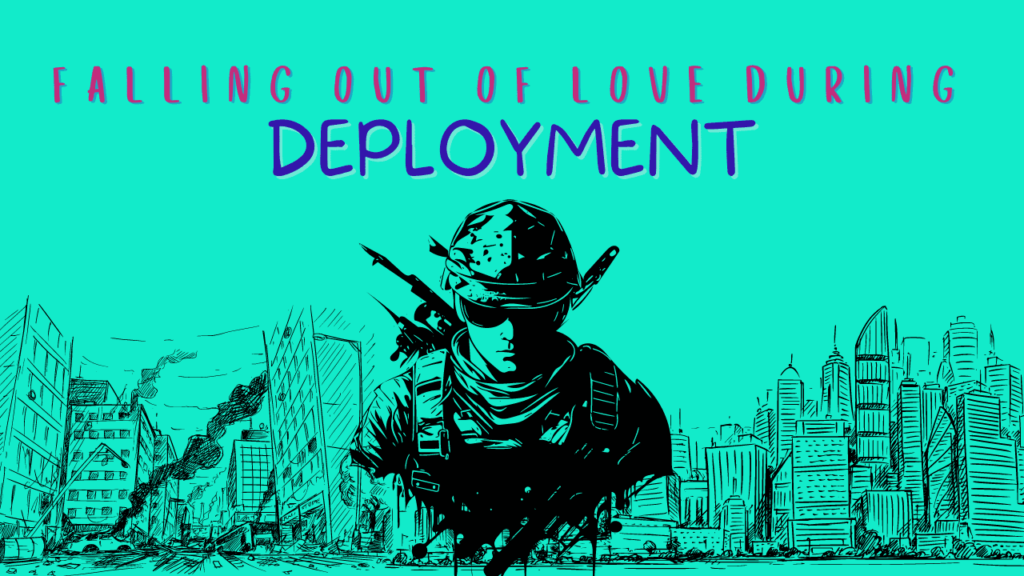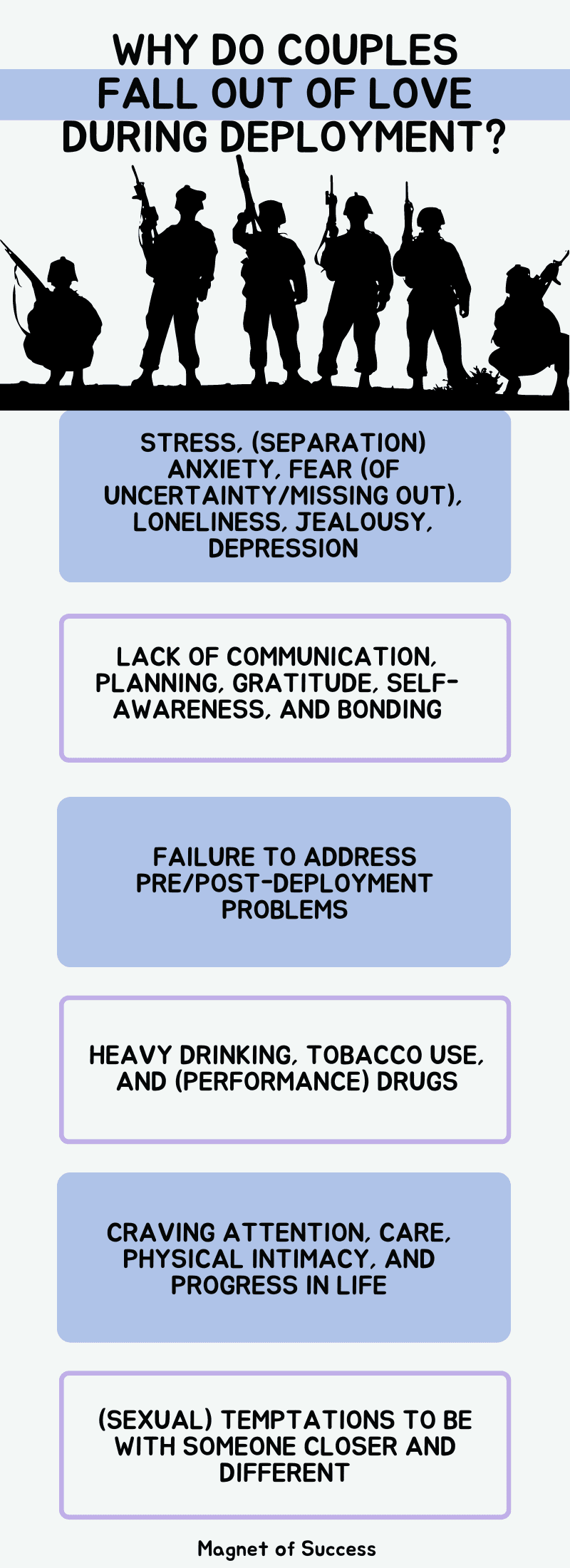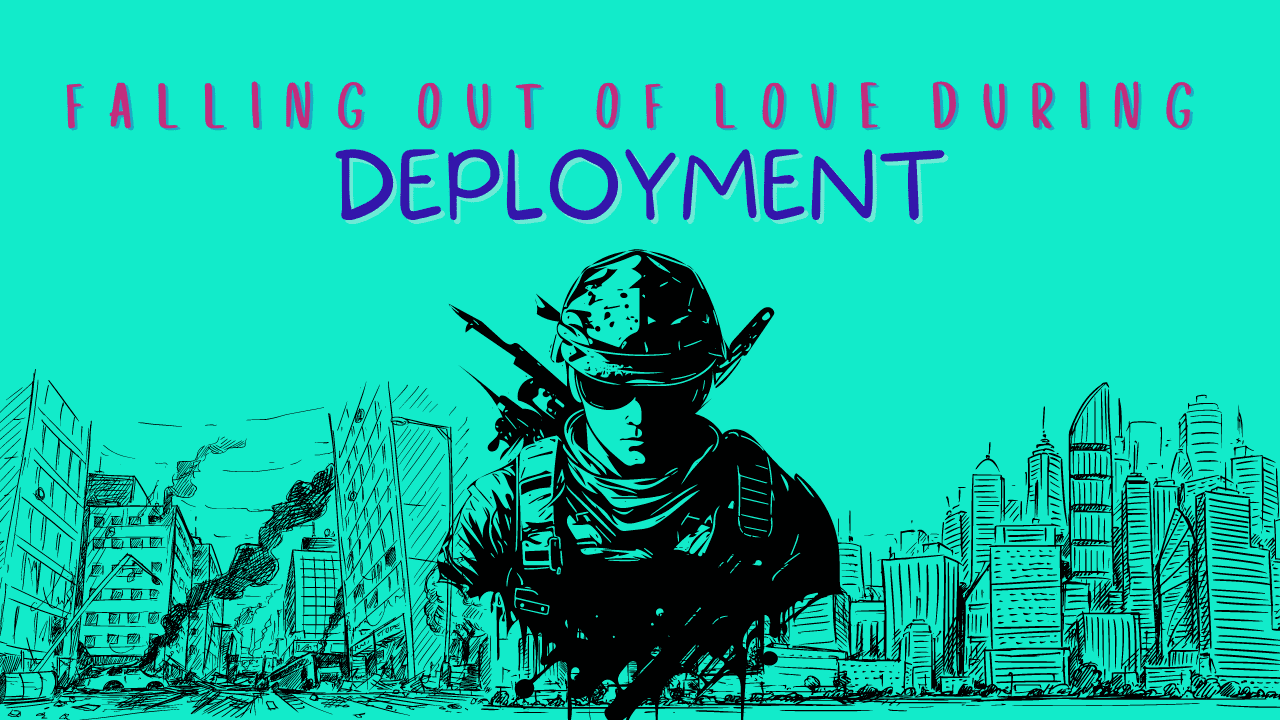Sadly, falling out of love during deployment is very common. Many women (and men) lose feelings for their partner while their partner is away. They think they no longer feel connected to their partner and that staying in a loveless relationship is a waste of time and emotion.
They’d rather move on with their life and be with someone who constantly makes them feel loved and valued – not just when their partner comes home or when they speak on the phone. That’s why they’re under the impression that if they don’t act fast and find a way to be happy that they’re committing to someone who’ll never make them happy.
Such people feel pressured to be happy, so they convince themselves they’re not getting enough love and attention from their partner and that they could be with someone more available to them. Someone who doesn’t worry them “all the time” and make them feel emotionally unfulfilled and stuck in life.
Because of such negative beliefs, they often start questioning their relationship and their love for their partner. They read stories about long-distance couples breaking up and see that it’s a perfectly normal thing to do. If others break up with their loved ones because of long-distance, they think it should be okay for them to do that too.
They aren’t happy or as happy as they’d like to be, so why not make a few healthy changes, aka get rid of dead weight?
This notion further decreases their commitment to their partner and makes it very tempting for them to leave a man or woman during deployment. It may not be the morally right thing to do, especially if their partner was deployed into a combat zone and is risking his or her life.
But when people convince themselves they’re not happy and that they deserve everything life has to offer, they tend to neglect their values and forget everything their partner did with them and for them. Moral values are subjective, so in their mind, it’s okay to leave as long as leaving improves the quality of their life and makes them happy.
Their happiness comes first, so breaking a commitment is a no-brainer.
The reason couples fall out of love during deployment is that time, distance, stress, fears, and a lack of talking and bonding decrease their attachment, determination, and desire to wait.
These things make them feel that they don’t need each other as much as they used to and that if they can go months without seeing each other that the relationship may not be as good as they’d thought.
In reality, it’s just as good as it had always been. They just don’t see it that way and appreciate it due to negative thoughts, physical distance, and a lack of conversation and bonding.
Both parties can fall out of love during deployment, not just the person (usually a woman) waiting for her man to return. The deployed person can also lose feelings over time. He can get used to a life without his partner, meet/text someone else, and/or feel overwhelmed and stressed because of work.
Stress is one of the biggest reasons couples break up. If a person doesn’t have good coping mechanisms, he can associate stress with his partner and stop valuing her. Basically, if he doesn’t deal with stress quickly and effectively, he can develop a belief that she’s taking energy and time from him and making him feel suffocated, annoyed, and disrespected.
So keep in mind that falling out of love during deployment isn’t limited only to the undeployed person. Both parties can lose feelings and interest if they neglect themselves as well as the relationship. But from what I see, the person with more dating options and fears of missing out tends to detach more often.
That person wants to have a “normal” relationship with someone physically close who is ready to bond and take the relationship to the next level (settle down, have kids, explore the world, etc.).
Oftentimes, a person who’s lost feelings for his or her deployed partner has already found someone else and is determined to monkey-branch into a new relationship.
By doing so, he or she can reduce loneliness and unhappiness and go through a new love phase.
In today’s post, we’ll go into detail about why people fall out of love during deployment. We’ll discuss how a long-distance deployment breakup can be avoided and what you must do if you think you’re heading towards one.


Why do couples fall out of love during deployment?
Couples fall out of love during deployment for different reasons. Those who didn’t get along prior to deployment break up because they don’t find ways to understand each other and work together quickly enough.
Due to limited time, privacy, and energy, they struggle to improve themselves and their relationship and experience the same issues as before. This leads to conflicts, disagreements, and/or slow fades.
The less attached person then loses feelings, pulls away, and finds something or someone else to spend time with. He thinks the relationship is holding him back from enjoying himself and being the person he wants to be.
As for couples who had a good relationship before the deployment, they tend to fall out of love due to a lack of bonding, gratitude, love, and commitment. Temptations to break up and be with someone else make them think they’re in a directionless, boring, or slow-paced relationship and overwhelm them.
To stay together, couples need to spend time together, in person, or over the phone. They can use instant messaging apps or write letters if they like. It doesn’t matter how they stay in touch as long as they communicate as often as they can.
Communication brings them closer whereas a lack of it increases the emotional distance between them, forces them to feel disconnected, and makes them more likely to clash. Disconnection then gives rise to negative, relationship-destructive thoughts.
If LDR couples entertain those thoughts, they risk falling out of love both rationally and emotionally.
Many people think love is just emotional, but it’s also rational. You may detach emotionally due to a lack of bonding, but you can still fall back in love if you’re self-aware and motivated to do so. You just need to find the reasons and the motivation to reconnect.
So bear in mind that couples fall out of love during deployment because they don’t talk enough and stay committed when they develop doubts, fears, insecurities, and temptations. Instead of resisting them and looking for reasons why they’re a good couple, they submit under pressure and let them control their feelings and direction in life.
When that happens, it’s only a matter of time before they fall out of love completely and fall in love with someone else.
With that said, here’s why couples fall out of love during deployment.


Many couples aren’t ready for a long-distance relationship, let alone a relationship in which they may not hear from their partner for days, weeks, or months. They want someone who gives them reassurance, love, attention, security, and support on a daily basis.
That’s why the moment they separate physically, they feel lost, anxious, and dissatisfied with their relationship and life and think they deserve something better. The longer they sit with such thoughts, the more of their unhappiness they associate with their relationship and make their relationship appear worse than it is.
If they don’t stop doing that soon, they eventually feel so unhappy, they think they must leave their partner and seek happiness elsewhere.
So if you, your partner, or someone you know are falling out of love during deployment, keep in mind that falling out of love doesn’t just happen on its own. It happens due to poor communication, a lack of communication, poor perception of the relationship, and a lack of self-investment and investment in the relationship.
Couples who ignore personal problems and relationship matters and think that relationships shouldn’t be hard have a poor relationship mentality and tend to leave relationships the moment things get difficult.
Such couples need to learn that relationships aren’t all sunshine and rainbows and that if they love a person, they need to wait for their deployed partner to come back and then discuss what they wish to change. If they can’t agree, only then can they break up and go their separate ways.
They shouldn’t leave while they’re apart (but still a couple) and find someone new to date.
Today, people are far less patient than they used to be back in the day. Despite being able to communicate long-distance via the internet, they lose sight of what’s important to them and attach to people who can satisfy their urges instantly.
In other words, they lack gratitude, morals, and respect and let their emotions control them.
I know it can be very tempting to start getting to know someone closer to you when your partner is out of the country or far away. The connection you have with your partner isn’t as strong as it used to be. Especially not if you already developed a connection with someone else.
But that doesn’t mean the new person is your ideal partner and that you should cheat. It’s a sign you’re doing something wrong and that it’s time to figure out what.
How can couples avoid falling out of love during deployment?
Falling in love is easy and requires no effort as it happens automatically. Staying in love, on the other hand, that’s a completely different thing. Couples can stay in love by understanding what love is and how it works.
By acknowledging the fact that relationships, especially long-distance ones require constant effort and dedication, couples can transition from being mere observers to active participants. This means that they prioritize their relationships, regularly communicate with their partners, and actively seek ways to strengthen their connection and mutual understanding.
One way for them to stay in love is to set aside time to connect, schedule regular voice and video calls, actively listen to each other, express empathy and gratitude, show support, and make plans for the future. Healthy communication can strengthen their feelings and make them feel that their relationship is meaningful.
If they can’t communicate because there’s no signal or way to communicate, however, then they need to discuss what their intentions are prior to the deployment. If they wish to stay together, they need to commit to each other, promise to wait/communicate when they can, and stick to their word.
A promise to remain faithful despite not talking to each other as often as they’d like is necessary so they can resist temptations and negative thoughts that enable so many couples to fall out of love.
As I said, it’s normal to feel disconnected. But falling out of love is a choice that couples make when they stop valuing each other.
There’s no secret method for staying in love when you’re far away from your partner and have no idea what your partner is thinking, feeling, and doing. But, fortunately, there are things LDR couples can do to make their relationship stronger.
They can improve their relationship by communicating effectively, identifying and resisting unwanted thoughts and emotions, learning to fully trust each other, and reminding themselves and each other that they are a good match for each other.
If they do that, they can remain committed even when an opportunity to be with someone else presents itself.
The problem for long-distance couples is that they often overprioritize physical bonding and allow themselves to become doubtful and envious of others. They want what their friends, colleagues, and family members have—and they want it right away.
As a result, they take their relationship for granted and give up on it even though it’s a good relationship.
So if you and your partner don’t want to fall out of love during deployment, make sure to deal with stressors, say no to drugs, avoid putting yourselves in positions that would make each other jealous, and leave on good terms.
You don’t want to leave on a bad note because that could create a lot of uncertainty and doubts.
Also, make sure to exchange gifts and reaffirm your commitments to each other. The stronger you prove your commitment, the more likely it is that you and your partner will stay in love and wait for each other despite the distance.
To conclude, deployment shouldn’t make you fall out of love if you value each other and maintain the relationship in ways that LDR couples can. But if you do fall out of love, then it’s safe to say that you, your partner, or both didn’t have the kind of commitment a relationship like this needed.
Are you falling out of love with your partner during deployment? What’s making you do that? Share your story in the comments below and maybe we can figure it out together.
However, if you prefer to talk discreetly, sign up for coaching on this page.






I always wondered about this topic, Zan! Now, this article has the heart to reread at some other time!
I was in a relationship and we had good relationship before the deployment, in a way my ex fall out of love and now I see that was due to a lack of bonding, gratitude, love, and commitment.
To stay together, couples need to spend time together that’s why our relationship tended to failed.
Thank you Zan for opening my eye and made me really see in the most healthiest way possible.
You are the best
Hi Linda.
People have the capacity to take anything for granted. Especially if they don’t do much to bond and stay on the same path. I hope you’re doing great!
Kind regards,
Zan
Breaking up during a deployment is one thing. Several guys I know have had it happen. What is wrong is the way the women handle it.
I had a close friend told right after he returned a year later but before he got home. OK, no problem. But then he discovered that he had been supporting her and her new boyfriend who basically destroyed his 4×4 truck and all his stuff was ruined or sold off. He was left alone with no money and a destroyed vehicle.
This is just beyond wrong.
A relative was told the day he deployed for combat duty. She refused to move and so the battle began.
I have other stories but in each case the woman ultimately chose the most immoral and ruthless way out.
I’m sure men have done the same. If you want out, get out but don’t steal, destroy and harm someone just so you can find a new bed partner or want out.
Hi DT.
I completely agree with you and sympathize with all the men who were victimized. I can’t even imagine how betrayed those men must have felt when they learned that their partner had been cheating on them. If their relationship wasn’t working out, they should have ended it and split their belongings. But instead, the women used the situation to their advantage and did what was best for them and their new partners.
Kind regards,
Zan